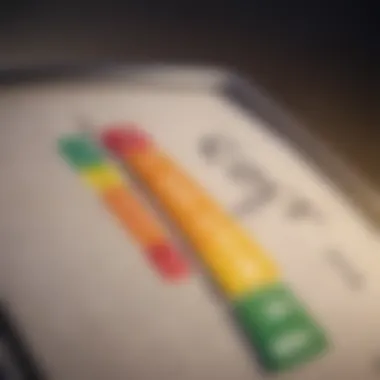Understanding a 571 Credit Score: Implications and Actions


Intro
A credit score of 571 falls into a category often referred to as fair. This score can significantly influence an individual's financial landscape. Understanding the implications of such a score is essential for anyone aiming to navigate the complexities of loans, credit card approvals, and mortgage applications. This article delves into the significance of a 571 credit score, its impact on various financial products, and actionable strategies for improvement.
As financial institutions increasingly rely on credit scores to determine eligibility for loans and credit, knowing how to evaluate and enhance one's credit profile becomes crucial. The following sections will highlight the key factors that contribute to a credit score, examine the possibilities and challenges associated with a 571 score, and offer guidance on taking actionable steps towards better credit health.
Overview of Financial Product
Definition
A credit score is a numerical representation of a person's creditworthiness. It is calculated using various factors, including payment history, amount owed, length of credit history, new credit, and types of credit used. A score of 571 indicates a moderate risk level to lenders.
Key Features
- Payment History: The most significant factor affecting a credit score, accounting for about 35% of the total score. Late payments and defaults can negatively impact this aspect.
- Credit Utilization: This reflects how much of your available credit you are using. A higher utilization ratio can suggest financial strain.
- Length of Credit History: This includes the age of your oldest account and the average age of all your accounts. Longer histories generally favor higher scores.
Purpose and Benefits
The purpose of a credit score is to provide lenders with a snapshot of an individual’s risk. A fair credit score can still allow for approvals but typically comes with higher interest rates or less favorable terms. The benefits of understanding your credit score are substantial. It helps in making informed decisions, preparing for loan applications, and identifying areas that require improvement.
Types and Categories
Insurance Types
While a credit score primarily affects loans and credit cards, it can also influence insurance premiums. Insurers may use credit scores as a factor in determining rates, particularly for auto and homeowners insurance.
Loan Types
- Personal Loans: Often obtained for various personal needs, a 571 credit score may limit options.
- Auto Loans: Approval is possible but may come with higher interest rates.
- Student Loans: Federal options typically do not consider credit scores.
Credit Card Types
- Secured Credit Cards: These may be available to individuals with a 571 score, requiring a deposit.
- Subprime Credit Cards: Designed for those with lower scores but generally include higher fees and interest rates.
Mortgage Types
Obtaining a mortgage with a credit score of 571 can be challenging. Options may include FHA loans, which often have more lenient guidelines, though the buyer may still face higher costs.
Pros and Cons
- Pros: Access to credit, potential for gradual score improvement.
- Cons: Higher interest rates, less favorable loan terms, and limited options.
Situational Uses
For someone with a 571 credit score, it is crucial to assess the purpose of obtaining credit and to weigh the potential costs against benefits carefully.
Application Process
Steps to Apply
- Evaluate Your Credit Report: Check for errors or outdated information.
- Compare Options: Research different lenders and their requirements.
- Gather Documentation: Collect necessary financial documents.
- Submit Application: Complete the application form and submit.
Eligibility Requirements
Eligibility can vary by lender but typically includes having a stable income, a valid social security number, and the ability to repay the loan or credit.
Documentation Needed
- Identification: Driver's license or another form of ID.
- Income Verification: Pay stubs or tax returns.
- Credit History: Credit reports from major credit bureaus.
Common Mistakes to Avoid
- Not Checking Credit Reports: Failing to review for inaccuracies.
- Applying Too Often: Multiple applications can hurt your score.
- Ignoring Lenders’ Criteria: Not considering unique requirements of each lender.
Tips for Success
- Be honest about your financial situation.
- Improve your score gradually before applying.
- Maintain a stable employment history.
Costs and Fees
Types of Fees Associated
- Application Fees: Some lenders charge a fee to process your application.
- Closing Costs: These are common for loans and can include various fees.
- Late Payment Fees: These can significantly increase the cost of borrowing if payments are late.
Premiums for Insurance
Insurance premiums can be affected by your credit score, leading to higher costs in some cases.
Interest Rates and APR for Loans/Cards
With a score of 571, expect higher interest rates compared to those with higher scores. This can substantially increase the total cost of borrowing.
Closing Costs for Mortgages


Understanding the closing costs associated with a mortgage is crucial. These can include appraisal fees, title insurance, and loan origination fees.
Comparisons of Costs Across Options
It's essential to compare various lending options carefully. Minor differences in rates can lead to significant variances in total repayment amounts over time.
Conclusion: Understanding a 571 credit score requires a minimalist approach to financial literacy. Awareness of the implications for loans, credit cards, and mortgages allows individuals to take control of their financial scenarios and strive for improvement. Stay informed and proactive to navigate the lending landscape effectively.
Preamble to Credit Scores
In this article, understanding the nuances of credit scores is crucial, especially as we focus on a 571 credit score. Credit scores play a significant role in shaping financial opportunities. Many people underestimate their importance, but these numbers often dictate loan eligibility, interest rates, and even housing prospects.
Definition of Credit Score
A credit score is a numerical representation of a person’s creditworthiness. It is calculated based on various elements of their credit history. Lenders use credit scores to assess the risk of lending money. Generally, scores range from 300 to 850. Higher scores indicate better credit management.
The calculation of a credit score typically involves multiple factors. Payment history, amounts owed, length of credit history, new credit, and types of credit used are the main contributors. Each factor is weighted differently, influencing the overall score. Understanding these components can help individuals manage their scores effectively.
Importance of Credit Scores
Credit scores have far-reaching implications. For many individuals, these scores determine whether they can secure loans for major purchases, such as homes or cars. A good credit score can lead to lower interest rates, which can save substantial amounts over time. Conversely, a poor credit score might result in higher rates or outright denial of credit requests.
Beyond loans, credit scores influence other aspects of life. Insurers may consider credit scores when determining premiums. In some cases, potential landlords or employers also review credit scores during their decision-making processes. This extensive use of credit scores highlights their critical role in modern financial systems.
A strong credit score is often seen as a foundation for achieving various financial goals and accessing quality opportunities.
In summary, understanding credit scores, particularly a score of 571, allows individuals to navigate the financial landscape effectively. This section has highlighted the definition and importance of credit scores. By grasping these concepts, one can appreciate the need for maintaining a healthy credit score and the potential consequences of neglecting it.
What is a Credit Score?
Understanding your credit score is vital for navigating financial opportunities. A credit score of 571 falls within the lower range of scores, which carries specific implications for one's financial health. Knowing how this score is defined and classified helps individuals assess their borrowing capabilities and financial options more accurately. This section will examine the significance of a 571 credit score within its broader context, as well as the factors that determine its classification.
Understanding the Range of Credit Scores
Credit scores typically range from 300 to 850. This range is divided into various categories, which indicate different levels of creditworthiness. A score below 580 is usually considered poor, while scores between 580 and 669 are viewed as fair. Scores ranging from 670 to 739 are in the good category, and anything above 740 is generally considered excellent. Therefore, a score of 571 is below the average threshold. This standing can limit access to credit products and higher interest rates if credit is available at all.
The significance of this range lies in its direct impact on individuals' borrowing power. When lenders evaluate creditworthiness, they typically base their lending decisions on this classification. Those with scores in lower ranges, like 571, may face challenges when applying for loans or credit cards. They must often seek alternatives or work towards improving their credit standing before they can access favorable terms.
The Credit Score Classification
A 571 credit score is classified as subpar, which presents distinct challenges. This classification reflects a combination of several factors including payment history, credit utilization, and account types. The payment history is often one of the most critical elements of a credit score. A series of late or missed payments can adversely affect the score.
Moreover, the credit utilization ratio—the amount of credit being used compared to available credit—plays a significant role. A score of 571 may indicate high credit utilization, which suggests that an individual may be relying heavily on credit. In addition to these factors, the length of credit history contributes to this classification as well. Young credit profiles or those with few accounts may present a limited picture of financial responsibility. Lastly, frequent credit inquiries can also lower a score and affect its classification.
Understanding what it means to have a 571 credit score helps individuals recognize where they stand in the credit landscape. It highlights the importance of addressing the issues that led to this score in the first place. Taking action can lead to improved financial outcomes in the future.
Credit Score Categories
Understanding credit score categories is crucial for individuals aiming to navigate their financial landscape, especially when discussing a 571 credit score. This score falls into a critical bracket that can largely influence a person's financial opportunities. Knowing these categories helps individuals recognize their standing and understand the implications it carries with respect to loans, interest rates, and overall financial health.
For instance, credit score categories can affect how lenders view potential borrowers. Higher credit scores open doors to better interest rates and easy approvals, which is not the case when you, for example, have a score like 571. Recognizing where this score positions you can guide your financial decisions and improvement strategies.
Bad Credit
A credit score classified as bad typically ranges from 300 to 579. Individuals in this category face significant challenges in accessing loans and credit products. For a score of 571, which sits at the higher end of this scale, the individual might still face difficulties securing a mortgage or getting approved for a credit card with favorable terms.
Many lenders view individuals in this category as high-risk. Consequently, when looking for loans or credit, they may encounter higher interest rates or even outright denials. The options available may also be limited to predatory lenders, which can exacerbate financial struggles through exorbitant fees and charges.
Fair Credit
Failing short of the 'good' classification, a fair credit score generally falls within the range of 580 to 669. Being at 571 means you land in this space. Although opportunities may open slightly compared to bad credit, considerable hurdles persist. While loan approvals might be more feasible, the terms offered will often be unfavorable, with average to high rates of interest.
A fair score often leads to better opportunities than those available to individuals in the bad credit category, but a 571 score means you need to work on your financial habits to avoid stagnation in this range.
Good and Excellent Credit
This category represents the upper echelon of credit scores, ranging from 670 to 850. These scores not only provide access to loans with advantageous terms but also facilitate negotiating better rates and lower monthly payments. Unfortunately, with a score of 571, this category remains out of reach.
To transition into good or excellent status, individuals must focus on improving their credit activities. They need to demonstrate responsible credit behavior, which involves timely payments, managing credit utilization effectively, and ensuring a diverse mix of credit types. Setting clear goals to enhance one's credit score can pave the way for accessing lower rates on future loans and credit products.
Understanding these credit score categories plays a vital role in improving personal finances. Recognizing where a 571 score places you can drive the necessary actions to enhance financial opportunities.
Implications of a Credit Score
A credit score of 571 is classified as a low credit score and brings various implications that can significantly impact financial opportunities. Understanding these implications is critical for anyone looking to improve their financial standing. The following sections will delve into specific areas affected by a 571 credit score, including access to loans, credit card eligibility, and considerations for renting and insurance.
Access to Loans
With a credit score of 571, access to loans can be severely limited. Lenders often see this score as a red flag, indicating a higher risk of default. This perception affects the borrower’s options for personal loans, auto loans, and even mortgages.
- Higher Interest Rates: If a loan is approved, it is likely to come with a significantly higher interest rate compared to borrowers with better scores. This can mean expensive monthly payments and increased overall loan costs.
- Limited Loan Amounts: Approval for loans may also come with stricter limits on how much can be borrowed. For example, someone needing a car loan may receive an offer for a lower amount than they originally sought.
- Alternative Lending Options: In some cases, individuals may turn to alternative lenders where requirements may differ, but these options can often be associated with even higher interest rates and unfavorable terms.
Understanding these aspects can help individuals navigate their borrowing options more effectively and prepare for potential finance challenges.


Credit Card Eligibility
A 571 credit score can complicate credit card eligibility significantly. Many credit card issuers may not approve applications from individuals with lower scores.
- Secured Credit Cards: At this score level, individuals may only qualify for secured credit cards, which require a cash deposit upfront. While these cards can help rebuild credit, they come with limitations on spending and often higher fees.
- Lower Credit Limits: Even if approved for a standard credit card, the credit limit may be substantially lower. This can restrict spending ability and impact credit utilization ratios negatively.
- Limited Rewards and Benefits: Cards available to lower credit score holders tend to have fewer rewards or benefits. This decreases their attractiveness for everyday spending.
Navigating credit card options necessitates a deeper understanding of what each issuer requires and what each card offers.
Renting and Insurance Considerations
A 571 credit score can also affect renting an apartment and obtaining insurance. Many landlords conduct credit checks as part of their tenant screening process, and a low score may hinder approval.
- Higher Security Deposits: Landlords may require higher security deposits from individuals with low credit scores as a safeguard against defaults.
- Rental Denials: In some cases, applicants may be outright denied due to their score. This can limit housing options.
- Insurance Premium Increases: Insurance companies may assess credit scores to determine policy premiums. Lower credit scores can lead to higher rates for renters and auto insurance, escalating monthly expenses.
Understanding these aspects is crucial for planning financial decisions and ensuring that one can find suitable housing and maintain necessary coverage.
A 571 credit score is a serious consideration that affects numerous financial aspects in a person's life. It is essential to recognize the implications to develop a strategy for improvement.
Making informed decisions based on the understanding of these implications can lead to better financial health in the long run.
Factors Influencing Your Credit Score
Understanding the elements that shape your credit score is crucial for anyone hoping to improve their financial standing. A credit score, as mentioned earlier, is not just a number; it's a reflection of your creditworthiness. Each component plays an important role in constructing the overall picture that lenders see. Familiarizing yourself with these factors can lead to better decisions that positively influence your credit score over time.
Payment History
Payment history is the most significant factor affecting your credit score, accounting for about 35% of the total score. It reflects your track record of making payments on time. Late payments, defaults, and bankruptcies can severely impact this aspect.
When evaluating your payment history, lenders seek assurance that you are a responsible borrower. Consistently meeting payment deadlines boosts your score and can lead to better loan terms in the future. Strategies to improve your payment history include setting up reminders or automatic payments to ensure you never miss a due date.
Credit Utilization Ratio
The credit utilization ratio refers to the amount of credit you are using compared to your total available credit. This metric significantly impacts your score, often making up about 30% of the total. A lower ratio indicates less risk to lenders, as it shows you are not overly reliant on credit.
To maintain a healthy utilization ratio, aim to keep it below 30%. This may involve paying off balances monthly or requesting a credit limit increase, ensuring that your usage remains proportionate.
Credit History Length
Credit history length contributes roughly 15% to your credit score. This factor reflects how long you've held different credit accounts. A longer credit history generally indicates reliability and experience in managing credit, which can favorably affect how lenders view you.
If you are starting with a new credit account, be patient. Avoid closing older accounts prematurely, as this can shorten your average credit history and diminish your score.
Types of Credit Accounts
Diversity of credit accounts counts for about 10% of your credit score. Having a mix of different types of credit—such as revolving credit (credit cards) and installment loans (auto loans or mortgages)—shows lenders you can handle various forms of credit responsibly.
When considering new credit, think carefully about the types you apply for. Gaining new types of credit gradually can positively affect this factor without overwhelming your finances.
Recent Credit Inquiries
Recent credit inquiries represent about 10% of your overall score. Each time you apply for credit, a hard inquiry is made, which can slightly decrease your score for a short period. Multiple inquiries in a short time can signal to lenders that you may be experiencing financial distress.
To minimize the impact of inquiries on your score, it's wise to limit the number of applications you submit. Instead of hastily applying for different credit options, consider focusing on a well-researched choice that best suits your financial needs.
Understanding these factors allows you to take actionable steps towards a higher credit score, enabling better financial opportunities in the future.
Improving a Credit Score
Improving a 571 credit score is essential for individuals aiming to enhance their financial opportunities. A score in this range can severely limit access to favorable loan terms, higher credit card limits, and even housing options. Addressing the factors that contribute to this score can open new pathways to financial stability and growth. By focusing on improvement strategies, those with a 571 credit score can gradually elevate their credit standing, which may lead to better interest rates and increased confidence in their financial decisions.
Timely Payments
Making timely payments is one of the most straightforward yet effective strategies for improving a credit score. Payment history constitutes a significant portion of the credit score calculation. Late payments can cause lasting damage.
Being consistently on time with payments demonstrates reliability. This habit shows lenders that you manage your finances responsibly. To ensure timely payments, consider setting up automatic payments or reminders. Incorporate this simple change, and it could positively influence your credit standing.
Reducing Credit Utilization
Credit utilization refers to the ratio of your current credit card balances to your total credit limits. For a 571 credit score, maintaining a low utilization ratio is crucial. Ideally, aim to keep your usage below 30% of your total credit limit.
To lower this ratio, begin by paying down existing balances. Another effective method is to request an increase in your credit limit. This allows your overall credit capacity to grow, potentially lowering your utilization percentage without changing your spending habits.
Monitoring Credit Reports
Regularly monitoring credit reports can help uncover issues impacting your score. Errors or outdated information can negatively affect your credit report. It is advisable to check your credit report at least once a year. Most major credit bureaus provide a free annual report.
Through monitoring, you can identify discrepancies or areas needing improvement. This awareness empowers you to take action, which can be beneficial in increasing your score over time.
Becoming an Authorized User
Another method to boost a credit score is to become an authorized user on someone else's credit card account. This status allows you to benefit from their positive payment history without being responsible for payments. Choose someone with a strong credit score and consistent payment history as this will reflect positively on your credit profile.
As an authorized user, you can steadily build your credit score. It is a practical option for young professionals or those with limited credit history.


Disputing Inaccuracies
Finally, disputing inaccuracies on your credit report is an important step in improving a 571 credit score. If you find errors, such as incorrect account information or outdated statuses, you can file a dispute with the credit bureau.
The process typically involves submitting a request for correction along with any supporting documents. Resolving errors can lead to a significant score boost, making this a critical strategy for anyone with a low credit score.
Regularly maintaining your credit profile is essential in achieving financial well-being. Small actionable steps can lead to significant improvements in a credit score.
Resources for Credit Improvement
Improving a credit score is an essential endeavor for anyone who finds themselves with a score like 571. Resources for credit improvement provide key guidance and tools to navigate the complexities of credit health. These resources can enhance financial literacy, provide support, and assist in the practical steps necessary to enhance one's credit profile. Understanding these resources is crucial as they can serve as a roadmap towards better financial opportunities and stability.
Credit Counseling Services
Credit counseling services offer personal advice from certified professionals. These organizations typically provide a comprehensive assessment of an individual's financial situation. They can also help in creating a budget that aligns with one's income and expenses. In addition, they can offer insights into effective debt management strategies.
The benefits of engaging with credit counseling include:
- Personalized Guidance: Counselors tailor advice to fit individual financial circumstances.
- Debt Management Plans: They can help create a structured plan to pay off debts systematically.
- Educational Workshops: Many services offer workshops to boost financial knowledge.
It is important to choose a reputable credit counseling agency. Look for agencies that are non-profit and accredited by the National Foundation for Credit Counseling (NFCC). This ensures the service is trustworthy and focuses on consumer education rather than profit.
Educational Materials
Educational materials are invaluable tools that provide knowledge necessary for understanding credit scores. They come in many forms, including articles, e-books, and online courses. These resources often address common misconceptions about credit scores and clarify the variables that impact scores.
Some key aspects include:
- Understanding Credit Scores: Materials explain what scores mean and the implications they have on financial opportunities.
- Managing Finances: Resources can detail budgeting techniques, savings plans, and effective spending habits.
- Credit Score Improvement Strategies: Many offer actionable tips, such as how to maintain timely payments and monitor credit utilization.
Accessing these materials can lead to informed decision-making regarding personal finances. Websites such as Wikipedia and Britannica can be helpful starting points.
Credit Monitoring Tools
Credit monitoring tools are essential for tracking changes in one's credit profile. These services notify individuals when significant changes occur in their credit reports, such as inquiries or changes in account balances.
The advantages of utilizing credit monitoring tools include:
- Real-Time Alerts: Immediate notification of changes helps users detect potential fraud quickly.
- Regular Updates: Users receive frequent updates, giving them an up-to-date view of their credit standing.
- Credit Score Tracking: Many tools provide access to credit scores and explain factors influencing them.
Some popular credit monitoring options include Credit Karma and Experian. By actively using these tools, individuals can stay informed about their credit health and take proactive steps in improving it.
To maintain and improve your credit score, utilizing a combination of counseling services, educational materials, and monitoring tools is essential for long-term success.
Long-Term Effects of a Low Credit Score
A low credit score can have significant long-term implications. Understanding these effects is essential for any individual navigating their financial journey, especially those with a credit score like 571. Not only does it influence immediate financial options but it also shapes future opportunities and overall well-being.
Impact on Financial Goals
A credit score of 571 can severely limit your ability to achieve important financial goals. For instance, buying a home or obtaining a car loan often becomes more challenging. Lenders may view you as a higher risk and could charge higher interest rates, making loans more expensive.
- Higher Costs: Additional fees might occur, and interest rates can increase significantly, leading to greater long-term payments.
- Difficulties in Securing Loans: Many financial institutions may reject applications from individuals with scores in this range. It leads to potential missed opportunities and financial roadblocks.
- Limitations on Credit Products: Access to credit cards with rewards or lower rates is often closed off, influencing everyday purchases and cash flow management.
Key Takeaway
A 571 credit score narrows the path to financial goals. Addressing this score must be a priority to offset future risks and expenses.
Employment Considerations
Surprisingly, a low credit score can also affect employment prospects. Many employers conduct credit checks as part of the hiring process, especially for positions involving financial responsibilities.
- Job Applications: A poor credit history can be a red flag. This may lead to fewer job offers and hinder career advancement.
- Security Clearances: For positions in government or certain industries, a low credit score can prevent individuals from obtaining necessary security clearances, impacting job eligibility.
- Stress and Job Performance: The worry about financial issues can lead to distractions and increase stress levels, which may affect job performance and overall productivity.
Important Point
Maintaining a healthy credit score is not only vital for securing loans but may also play a role in long-term career success.
Emotional and Social Consequences
The repercussions of a low credit score reach beyond financial implications, impacting emotional and social aspects of life. Individuals with low scores often face feelings of anxiety and stress about their financial futures.
- Anxiety and Stress: The constant worry about repayment, loans, and future financial decisions can lead to mental health challenges.
- Social Stigma: Many individuals feel embarrassed about their financial situation, which can limit social interactions and relationships.
- Reduced Opportunities for Networking: Networking often relies on social activities, and financial limitations may restrict participation in events, further isolating individuals.
Closure for Readers
Attempting to improve a credit score is not simply about numbers; it involves managing emotions and relationships too. Understanding these long-term effects can stimulate action for a better financial future.
Finale
Summarizing the Importance of Improving Your Credit Score
Improving a credit score is crucial for long-term financial health. A score of 571 falls into the range that can limit your options, affecting not just loan approvals but also interest rates and insurance premiums. Enhancing your score can open doors to better financial products and conditions. This improvement is not merely a number; it signifies greater trust from lenders. A stronger credit profile can translate into substantial savings over time. Thus, it is essential to recognize the significance of each action taken toward bettering your score as it directly impacts your financial future.
Next Steps for Readers
For those who wish to take action, consider these steps:
- Start by checking your credit report for errors. Disputing inaccuracies can potentially lift your score.
- Make timely bill payments consistently. This builds a positive payment history.
- Work on reducing your credit utilization ratio. Ideally, keep it below 30% of your available credit.
- Monitor your credit on a regular basis. Tools like Credit Karma or Experian can be useful.
- Lastly, consider seeking advice from professionals, such as credit counseling services.
By following these steps, readers can actively work towards improving their credit score. The journey is gradual but well worth the effort. For further insights on credit improvement, one can explore resources like Wikipedia or engage in discussions on platforms like Reddit.



